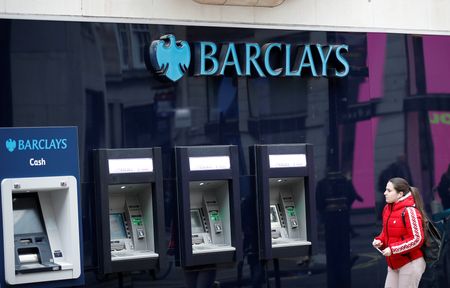 1
1 1
1

By Lawrence White and Iain Withers
LONDON (Reuters) -Barclays reported better than expected first-quarter profit on Thursday after a strong performance from its credit card business offset pressure on other business lines.
The British bank’s pretax profit of 2.6 billion pounds ($3.25 billion) beat analyst forecasts for a repeat of the previous year’s 2.2 billion pounds.
Analysts at JPMorgan said Barclays delivered a “solid” set of results that could lead to upgrades in analyst forecasts for the bank’s full-year profit.
Income at the lender’s consumer, cards and payments division rose 47% to 1.3 billion pounds thanks to rising credit card balances driven partly by its acquisition of a portfolio from retailer Gap last year.
While higher credit card spending boosted Barclays’ finances, there were signs this could have a sting in the tail. The bank’s bad loans provision for the quarter soared to 524 million pounds from 141 million a year earlier, which it blamed mainly on its U.S. cards business.
Investment banking, a source of strength in recent quarters, was more mixed, with income from its global markets trading business sliding 8% and fees from advising on corporate mergers and fundraisings down 7%.
Mergers and acquisitions activity shrank to its lowest in more than a decade in the first quarter as rising interest rates and high inflation reduced appetite for dealmaking.
Fixed income, currencies and commodities (FICC) was a bright spot, with income rising 9% to 1.8 billion pounds. Transatlantic rival Morgan Stanley this month reported a 12% fall in FICC revenue.
The bank made no further charges for an earlier administrative trading error that has blighted recent results and led it to agree a $361 million penalty with U.S. regulators last year for “staggering” failures in overselling $17.7 billion of structured products.
($1 = 0.8012 pounds)
(Reporting by Lawrence White and Iain WithersEditing by Sinead Cruise and David Goodman)